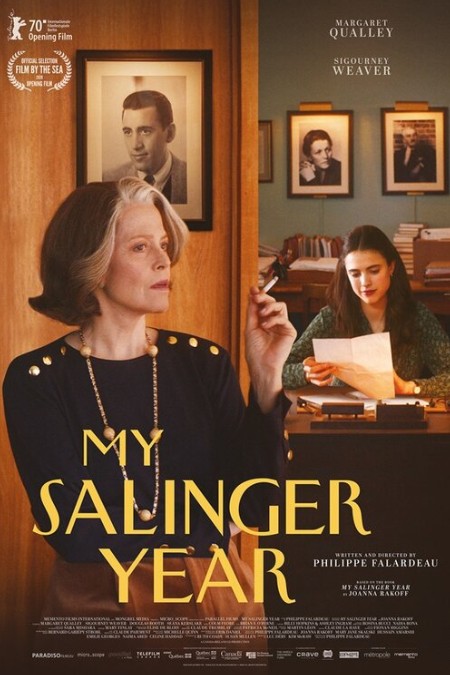In an idealised world, pursuing your dreams is a thing of ethereal perfection, a waftingly hopeful sensation that is equal parts sigh-inducing wonder and a tenacity to succeed that always pays off and is never less than astoundingly and soul-enrichingly triumphant.
Alas, we beings with feet of dream-hollowing clay do not live in a world of ideals and flaw-free hope, and so, we can, like Joanna Rakoff, the protagonist of My Salinger Year, based on the 2014 novel of the same name, can find ourselves wholly unsure of how to make the glittering possibilities in our mind find pleasing and workable form out in the unforgiving environs of the real world we inhabit.
Written and directed by Philippe Falardeau, the tale of Rakoff’s year working at the Harold Ober Associates in New York City in 1995, one of whose agents, Phyllis Westberg (played as Margaret in the film by Sigourney Weaver) acted for the famously reclusive J. D. Salinger, author of the seminal text Catcher in the Rye, a novel which attracts a loyal and thoughtful following including a boy from Winston-Salem, played in the film by Théodore Pellerin.
It is Joanna’s job, in-between acting as Margaret’s personal assistant, to answer the fan mail that is sent to Salinger via the agency in great sticks of hopeful literary criticism by people for whom the Catcher in the Rye is far more than just a book and more akin to a religious experience of some kind.
Margaret is dismayed to find out that the agency simply sends empty, emotion-less form letters to these enthusiastically hopefully fans, the same templates that have bene in use since 1963, letters by the way that have to be typed on a typewriter since Margaret believes that computers don’t make work easier, they create and complicate it.
An aspiring poet who has left her studies in Berkeley and her long-term boyfriend Karl (Hamza Haq) to return to her roots in New York City, Joanna is sworn to secrecy on her writing ambitions since literary agencies, and Margaret in particular, frown on people working for them who are actually writers.
With her creativity stifled – though to be fair, Joanna doesn’t seem to pursue her writing dreams with much fervour or commitment in her out of work hours, with only the odd poem ever seen on the go – the newest employee of a staid and longstanding literary agency is forced to find her creative satisfaction in other ways, including writing personalised responses to the letters, a big no-no which in the end doesn’t seem to get her into too much trouble.
That is largely because, we are led to believe, Margaret is loathe to interrupt Salinger’s routine – he is fiercely and closely protected though through the film, Joanna, who answers all of Margaret’s calls, comes to know Salinger in a way that suggests he is more normal and grounded than his reclusive reputation suggests – and also that Margaret, with whom a fearless Joanna slowly builds a kind of mentor/mentee rapport, sees a future literary agent star in Joanna.
But writing is what drives Rakoff, and even though the world lies at her feet, her somewhat lukewarm relationship with New York boyfriend Donny (Douglas Booth), she finds herself in the position of having to decide between her dreams of literary fulfilment and her proven ability to be one of the people behind the scenes making other peoples’ dreams happen.
Unlike The Devil Wears Prada, which beat at a furiously, fervent pace, My Salinger Year follows a far more leisurely course, possessing neither narrative highs nor lows, content to let the year of the movie unfurl in ways both languid and emotionally subdued.
That is not necessarily a bad thing since the film is less concerned with creating a sense of tension and dreams teetering on the brink that building a slow realisation by Joanna that her impulsive dream to stay and write in New York City may require a far more hands-on and active approach that she is employing.
Unfortunately, enjoyable though the leisurely, character-rich and dialogue luxurious pace is, made all the richer by fine performances by Qualley and Weaver in particular, it also means that My Salinger Year ends up feeling a little aimless and unfulfilling.
When big emotional events take place or epiphanies do make their eye-opening presence felt, they feel underwhelming, less a stellar step in a new direction and more simply another notch on a meandering path to somewhere hopeful and new.
The overall effect, however, is a pleasant one, mirroring the way in which most peoples’ lives slowly unwind, neither excitingly thrilling nor depressing low, simply there, punctuated by small, incidental moments which are neither good nor bad.
It’s hard not like Joanna or Margaret who, though they are wholly different ages and personalities, nevertheless share a common need to follow their dreams though it soon emerges that these dreams are at different points in their realisation and composed of wholly different parts and needs.
In the end, Joanna has to make a decision about where her future path lies, a narrative end point that you can see coming a mile off and which feels less of a momentous decision and more one borne of quiet, burbling inevitability.
For all that lack of any real narrative tension, with nothing Joanna does really bringing any sort of meaningful consequences, My Salinger Year is still a delightful film in which to immerse yourself, a love letter to dreams, hopes and the fact that reputations and perceptions do not always, in fact rarely, equate to reality and that sometimes we have to put aside expectations and and ignore momentum and and take some risks and see where they take us in a world where dreams only seem to come true if you put your heart and soul into them.
